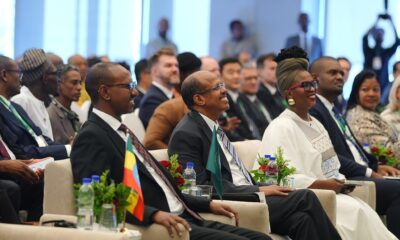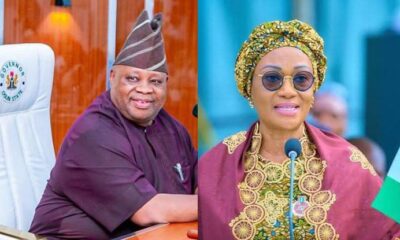National Issues
Perilous Verdicts: Democracy on the Brim, The Alarming Threat of Recent Judicial Decisions in Nigeria -By John Egbeazien Oshodi
The cherished principle of honoring the majority’s will appears to be on an unexpected detour through the hallowed halls of the courthouse. Is this a stark reality check for democracy, or are we merely witnessing a theatrical plot twist in the grand theater of absurdity? Are these judicial heads taking the people for fools, orchestrating a ride through the landscape of a developing society where police brutality can quell protests? Well, not for long. Soon enough, “enough” will truly be enough.

In the aftermath of the recent elections in Nigeria, a disconcerting pattern has materialized, casting a profound shadow over the democratic landscape. Notably, the mandates of three elected governors—Dauda Lawal of Zamfara State, Abba Kabir Yusuf of Kano State, and Caleb Mutfwang of Plateau State—were abruptly terminated by the decisions of the Appeal Court.
The increasing pattern of controversial judicial declarations in states controlled by opposition political parties raises compelling questions about the potential manipulation of the courts. This intriguing trend, spanning states such as Nassarawa, Kano (with confused verdicts), Zamfara, and now Plateau, suggests a perplexing situation where electoral outcomes seemingly missed by the ruling party on Election Day are, instead, handed to them through the corridors of the courts. The concentration of such occurrences in opposition-controlled territories adds a layer of suspicion, prompting concerns about the impartiality and independence of the judicial processes involved. This dynamic invites a closer examination of the intricate intersection between legal proceedings and political maneuvering within the context of Nigeria’s democratic landscape.
This simultaneous upheaval has sparked a surge of fear and suspicion, pushing citizens to question the legitimacy of the democratic process and the independence of the courts. As the dust settles on these contentious verdicts, it becomes increasingly important to conduct a thorough evaluation of their consequences for Nigeria’s democratic fabric. The perceived anti-democratic threats emitted by these verdicts, as well as their possible consequences for the nation, are evident.
Nigerians must heed the alarm about recent judicial decisions, recognizing their potential to reshape the legal and political landscape. The decisions may carry adverse consequences, possibly conflicting with democratic principles. Encouraging public awareness and engagement becomes reasonable in the face of these developments. In democratic societies, citizens’ vigilance and participation are indispensable for holding institutions accountable and ensuring governance aligns with the values and expectations of the people. Concerns amplify regarding judicial decisions, concentrating power in the hands of a select few judges. At the core of these apprehensions is the idea that the judiciary, through its decisions, might be subverting the will of the people expressed through the democratic electoral process.
This sparks a broader conversation about the judiciary’s role in upholding democratic values, emphasizing transparency and fairness in electoral processes. Calls for an “uproar” in response to perceived injustices or threats to democratic processes echo the sentiment of individuals deeply invested in issues affecting their society. Public outcry, peaceful protests, and civic engagement become mechanisms for citizens to voice concerns, demand accountability, and call for change.
Concerns expressed reflect a common worry about the potential consequences of institutional actions that could erode public trust, leading to a loss of confidence in democratic processes. Emphasis on caution within the judiciary and the need to prevent powerful politicians from unduly influencing judicial decisions aligns with principles of judicial independence, integrity, and accountability. The judiciary plays a crucial role in upholding the rule of law, ensuring fairness, and protecting the rights of citizens.
Amidst the palpable unease surrounding these abrupt changes in political leadership, there is a growing sentiment that demands the attention of Nigeria’s highest legal authority. The nation’s Chief Justice finds himself at a crucial juncture where the public’s trust in the judiciary hangs in the balance. Advocates for democratic stability and transparency argue that the Chief Justice should consider private interventions with his colleagues. The aim is to underscore the imperative of exercising utmost caution in the decisions that shape the country’s political landscape. The call for a discreet, internal dialogue within the judiciary reflects a deep-seated concern that public perception, a cornerstone of any thriving democracy, may be at risk of erosion. As this exploration delves into the circumstances surrounding these judicial actions, the role of the Chief Justice in safeguarding the integrity of the judiciary will be a focal point of scrutiny.
The recent removal of elected officials through judicial decisions has left a lingering unease, with some observers expressing concerns about what they perceive as institutional extremisms. While the term may evoke unsettling thoughts of potential upheaval, it is essential to clarify that such expressions are not a call for drastic measures, including military intervention or violent protests. Instead, they underscore the gravity of the situation and the need for a careful examination of institutional practices.
The recent removal of elected officials through judicial decisions has left a lingering unease, with some observers expressing concerns about what they perceive as institutional extremisms.
In navigating the complex terrain of recent judicial decisions, the judiciary must exercise prudence, avoiding inadvertent alignment with powerful politicians. Judicial independence, a legal doctrine and a democratic safeguard, demands a delicate balance in upholding justice while preventing erosion of democratic values. The potential repercussions of pushing public tolerance boundaries are clear—a stern warning echoes: “Do not test the will of the people; enough is enough.” This sentiment, not a call for violence, underscores the resilience of a populace that may assert its collective will when be pushed too far.
As discussions unfold, the risk of public backlash becomes apparent, emphasizing the delicate construct of the people’s trust in the democratic process. The exploration delves beyond legal intricacies into broader implications for democratic stability and public trust, urging the judiciary, a cornerstone of democracy, to navigate with utmost caution.
Diving into recent judicial decisions, the focus extends to the Supreme Court’s role in resonating with the public, instilling confidence in democracy. Upholding the law while safeguarding the democratic spirit requires a nuanced approach. Calls for the Chief Justice’s discreet intervention underscore the pivotal leadership role in safeguarding public trust. The caution against institutional extremisms serves as a reminder— the judiciary must stand firm, resisting undue influence, with resilience finding expression in the assertion of collective will.
Judicial decisions, especially with political ramifications, impact public trust. Judicial independence remains fundamental, but judges must grasp broader societal implications. Engaging in internal discussions about consequences and public perception contributes to a judiciary sensitive to societal needs.
Open communication within the judiciary and other branches maintains public trust without compromising judicial independence. Encouraging judges to consider public impact, engage in ethical self-reflection, and foster responsibility aligns with the judiciary’s role in democracy. At this pivotal juncture in Nigeria, navigating challenges requires a delicate balance— the judiciary must uphold justice, transparency, and democratic values.
This stance reflects a commitment to democratic ideals, urging institutions, including the judiciary, to function for the common good and safeguard the democratic process. For democratic stability, the judiciary, especially the Supreme Court, must heed public perception. The sentiment echoes that the judiciary should consider broader implications, not solely technicalities, emphasizing the people’s trust in the democratic process.
As Nigeria stands at the edge of a judicial abyss, recent decisions echo a haunting warning. The psychological fabric of democracy teeters on the brink, challenged by verdicts that cast shadows on the very essence of governance.
In the face of these perilous verdicts, the nation grapples with the delicate task of navigating the abyss. The call for a nuanced understanding, cautious judicial intervention, and public awareness becomes paramount. The fate of democracy rests on the collective psyche, urging a resolute commitment to justice, transparency, and the preservation of democratic values.
In the expansive canvas of Nigeria, where a mere trio, quartet, or even a quintet of judges possesses the mystical ability to rewrite the electoral narrative crafted by millions, one can’t help but feel a sense of bewilderment. Have we inadvertently stumbled into a twilight zone of democracy, where the sanctity of the people’s voice is overshadowed by the gavel’s decree? The legitimacy of this concentrated judicial power play now stands in the glaring spotlight, prompting quizzical looks and a collective squint from those who believed democracy was a narrative authored by the people, not a script edited by judicial panels.
The cherished principle of honoring the majority’s will appears to be on an unexpected detour through the hallowed halls of the courthouse. Is this a stark reality check for democracy, or are we merely witnessing a theatrical plot twist in the grand theater of absurdity? Are these judicial heads taking the people for fools, orchestrating a ride through the landscape of a developing society where police brutality can quell protests? Well, not for long. Soon enough, “enough” will truly be enough.
Professor John Egbeazien Oshodi, who was born in Uromi, Edo State, Nigeria, to a father who served in the Nigeria police for 37 years, is an American-based police and prison scientist and forensic, clinical, and legal psychologist. A government consultant on matters of forensic-clinical psychological services in the USA; and a former interim associate dean and assistant professor at Broward College, Florida. The Founder of the Dr. John Egbeazien Oshodi Foundation, Center for Psychological Health and Behavioral Change in African Settings. In 2011, he introduced state-of-the-art forensic psychology into Nigeria through N.U.C. and Nasarawa State University, where he served in the Department of Psychology as an Associate Professor. He has taught at various universities and colleges including Florida memorial University, Florida International University, Broward college, Lynn University, and a contributing faculty member at the Weldios university in Benin Republic, Nexus International University, Uganda, Nova Southeastern University and Walden University in USA. He is a Human Rights Psychologist with a focus on African related environments. john.oshodi@mail.waldenu.edu










